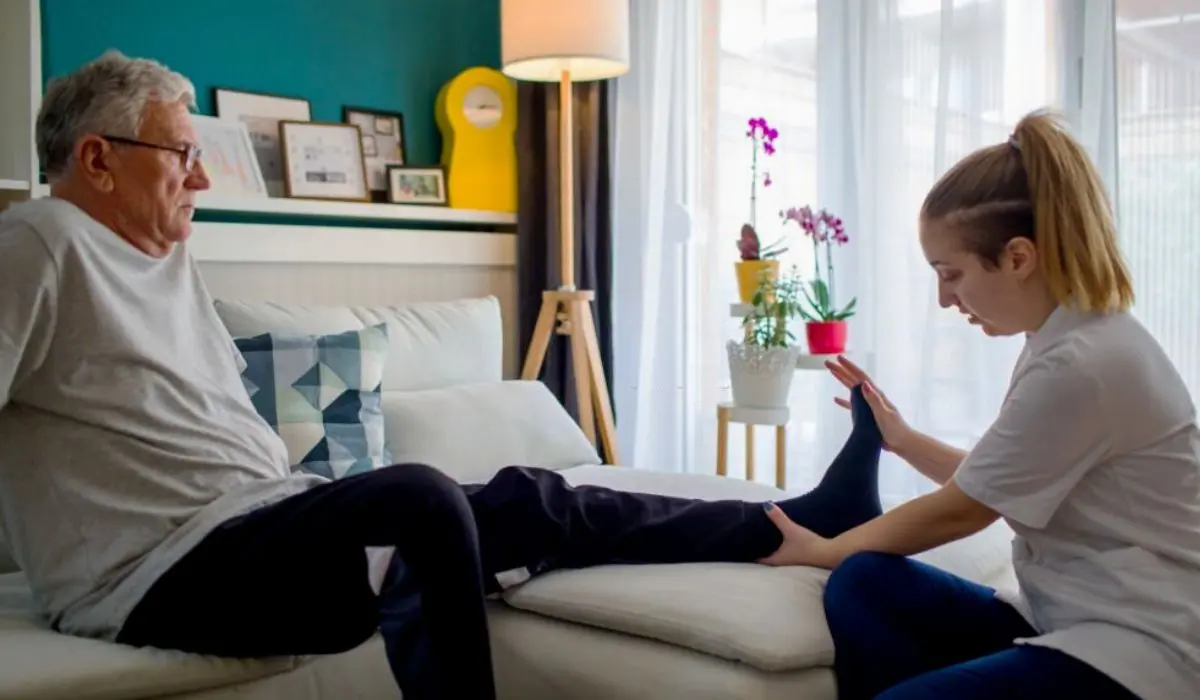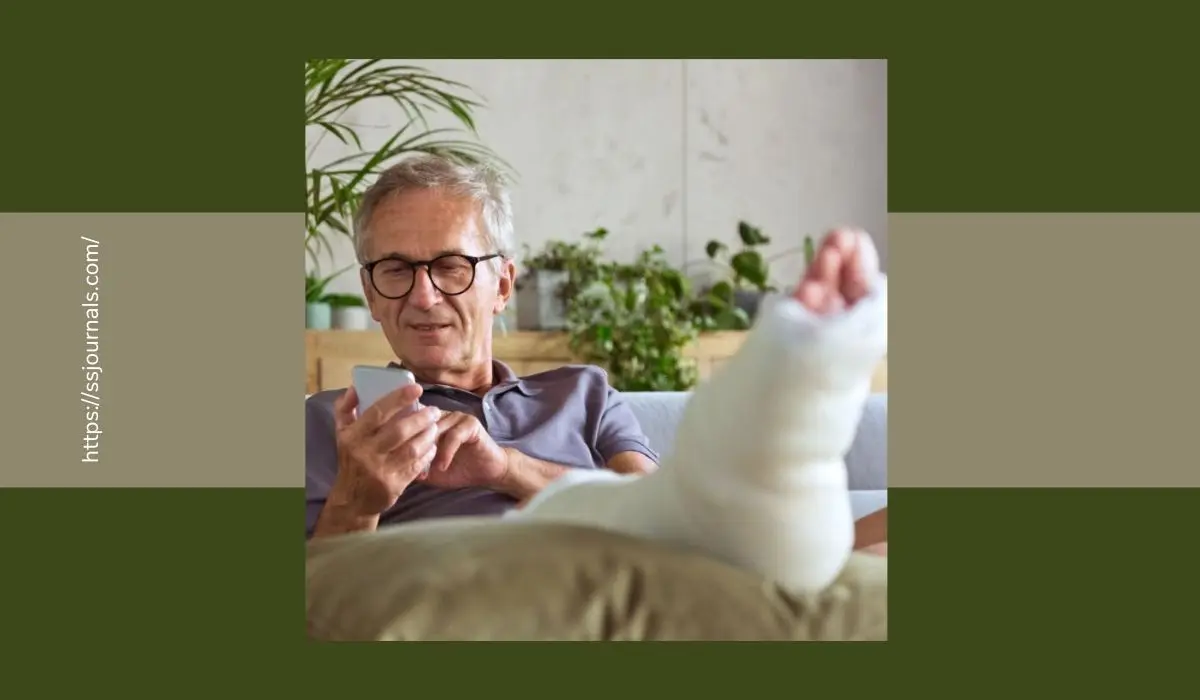As we age, our feet become more susceptible to various injuries and pain. Factors like reduced circulation, decreased skin elasticity, weaker bones, and muscle loss make the feet of older adults more vulnerable.
Common foot injuries seen in seniors include bunions, corns, calluses, arthritis pain, strains, sprains, and fractures.
While these injuries may heal slower with age, there are many natural remedies and precautions older individuals can take to find relief from foot pain and prevent future injuries.
What Is Foot Injury In Older Adults – How It Is Caused?
Foot injuries in seniors are damage inflicted to structures in the feet due to factors such as:
⚜ Wear and tear over time: Lifelong use leads to issues like calluses, bunions, and arthritis wearing down joints.
⚜ Reduced circulation: Impaired blood flow from age makes it harder for injuries to heal.
⚜ Weakened bones: Osteoporosis causes easier fractures and breaks in older adults.
⚜ Muscle loss: Calf and foot muscles weaken with age leading to instability and strains.
⚜ Numbness: Lack of sensation from nerve damage means injuries go unnoticed.
⚜ Improper footwear: Shoes without support heighten injury risk during exercise or falls.
⚜ Impact from exercise: Sudden increases in walking/running mileage lead to overuse injuries.
– Poor vision: Inability to see hazards increases the likelihood of stubbing toes or tripping.
⚜ Falls: Loss of balance or tripping leads to ankle sprains, fractures, and bruises.
⚜ Diabetes: Nerve damage in the feet from high blood sugar causes loss of protective sensation.

How To Cure Foot Injury In Older Adults?
Treating foot injuries in seniors involves:
⚜ Resting: Stay off injured feet to allow structures to heal.
⚜ Ice: Applying ice packs reduces swelling and pain.
⚜ Compression: Wrapping feet in elastic bandages provides support and stabilization.
⚜ Elevation: Keeping feet raised above heart level minimizes swelling.
⚜ Pain medication: Over-the-counter meds like acetaminophen reduce pain.
⚜ Bracing: Supports like splints or special shoes immobilize and protect injured feet.
⚜ Surgery: Severe cases may need surgery to fix fractured bones, fuse joints, or release trapped nerves.
⚜ Physical therapy: Stretching, strengthening exercises facilitate recovery after injury.
⚜ Modifying activities: Avoiding certain motions prevents aggravating injury during healing.
Related:- What Is The Cause Of Foot Fungus? Root Causes Explained
Natural Remedies To Prevent Foot Injury In Older Adults
Alongside conventional treatment, seniors can try these natural remedies to help speed up recovery and prevent re-injury:
⚜ Contrast Baths
Alternating soaking feet in hot and cold water boosts blood flow to stimulate healing.
⚜ Essential Oils
Massaging anti-inflammatory oils like eucalyptus, peppermint, and wintergreen eases arthritis pain and swelling.
⚜ Acupuncture
Acupuncture treatments reduce chronic foot pain and increase circulation to prevent injuries in seniors.
⚜ Yoga Poses
Gentle poses like flexing feet and stretching calves improve mobility and strength.
⚜ Turmeric
Consuming turmeric daily has anti-inflammatory effects to relieve pain. Apply externally too.
⚜ Magnesium
Absorbing magnesium relieves muscle cramps and spasms in feet. Get from foods like spinach.
⚜ Foot Massage
Massage boosts blood flow and loosens tight muscles that contribute to injuries.
⚜ Orthotics
Custom shoe inserts provide arch support, cushioning, and stability to prevent injuries when walking.
⚜ Proper Footwear
Well-fitting, supportive shoes are key for avoiding fractures and oxidative damage during exercise.
⚜ Stay Hydrated
Drinking adequate water improves circulation to feet to prevent injury-causing cramps and swelling.
Precautions For Having Foot Injury In Older Adults
Seniors with foot injuries should take these safety precautions:
⚜ Wear prescribed orthotics and braces to support the injured foot. Don’t skip even if the pain subsides.
⚜ Take medications only as directed to avoid side effects or allergies.
⚜ Monitor for signs of infection – swelling, oozing, redness, fever. Seek medical care promptly if these occur.
⚜ Keep blood sugar under control if diabetic as high levels impede healing.
⚜ Maintain a healthy diet and activity to prevent weight gain during immobility from injury.
⚜ Don’t resume full activity until the doctor confirms complete healing to avoid re-injury.
⚜ Consult a doctor about safe foot care – soaking, filing calluses, trimming nails, etc.
⚜ Monitor for new numbness which could indicate nerve damage. Report any loss of sensation.
⚜ Use prescribed ambulatory aids like canes or walkers to avoid falls when resuming activity.
⚜ Wear slippers both indoors and outdoors to cushion feet. Avoid bare feet.
⚜ Sit immediately if you experience dizziness or unsteadiness which could lead to new injury from falling.
⚜ Keep floors clutter-free, install grab bars in the bathroom, and improve lighting to make the home environment safer.
Conclusion
The feet undergo many changes with aging that make seniors more prone to various injuries – from minor bruises and calluses to serious fractures.
Proper care and footwear along with activity modifications, assistive devices, and natural remedies can help older individuals recover from existing foot injuries as well as prevent future ones. Caring for the feet is essential to maintain mobility and independence during our golden years.
Consulting doctors promptly at the first sign of foot injury will also facilitate the healing process. With some knowledge and preventative care, older adults can stay active while keeping their feet healthy and pain-free.
Read More:- Sudden Ankle Pain Without Injury – Natural Remedial Methods!
FAQs
1. What vitamin supplements help with foot injuries in the elderly?
Vitamin D and calcium supplements are often recommended to support bone healing from fractures. Vitamin B aids nerve repair.
2. How can I make my home safer to avoid foot injuries as a senior?
Install grab bars in bathrooms, remove loose rugs, have adequate lighting, clear clutter, and use chairs with arm support.
3. What changes in feet signal issues like arthritis as we age?
Signs are – stiffness, swollen joints, pain, redness, numbness, bunions, and difficulty walking. See a podiatrist promptly.
4. Should older people with foot injuries wear open-back slippers?
No, closed-back slippers or shoes provide more support and safety for the injury than open-back slippers.
5. How long do foot injuries take to heal for older adults?
Healing often takes longer – from a few weeks for minor sprains to several months for fractures. Follow your doctor’s advice diligently.

